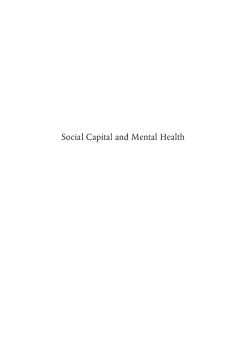
Additional Information
Book Details
Abstract
`The effects of social context and social structure on health are well documented. The concept of social capital provides a slightly different take on the issue, as it attempts to discover the features of populations in different areas that are crucial in determining the extent and the quality of social interactions and the social institutions within society. Such factors as social networks, levels of participation in civil life (as a citizen) and levels of trust within communities are all associated with social capital.
This book provides a detailed exploration of the concept, on its effects on psychological functioning and on the risk factors for mental health that are associated with communities that have either high or low levels of social capital.' - Community Care
Why do some areas have a higher prevalence of mental illness than others? How does the structure of a society affect its inhabitants' mental health? This remarkable book is the first to explore in detail the concept of social capital and its implications for mental health policy.
Drawing on evidence from international research and fieldwork, the contributors examine the risk factors for mental health associated with both low and high social capital communities. They discuss the importance of relationships between individuals, groups and abstract bodies such as the state and outline different systems of social capital, for example intra-group `bonding' and inter-group `bridging'. The authors challenge the notion of community as a strictly area-based concept and call for broader-based studies of communities built around race, faith or even around a common social exclusion. Social Capital and Mental Health also reviews methods of measuring social capital, analyses the implications of research findings for future policy developments and makes clear recommendations for future practice and research.
This book will be an informative and engaging read for sociologists and psychiatrists, and an incisive resource for policy makers and practitioners.
`Amid ongoing, often bitter debate as to whether social or material factors have the greater impact on public health, this is the first book to look at the research on social capital from a mental health perspective.
It's an impressive collection, with international studies from the US, Columbia, South Africa and Holland, as well as challenging reflections on theory by the editors and a welcome systematic review of methodolody by Mary de Silva…In refusing to gloss over some uncomfortable contradictions in the research on social capital, Mckenzie and Harpham provide a welcome reminder that inequalities are important, whether interpreting social or material determinants of mental health.'
Mentalhealth
`This book will be of interest and relevance, not only to students and academics working in areas associated with health and social policy, care and welfare, but also to practitioners and those involved in different levels of policy development. This will include readers working in interprofessional health and social care settings, or from a range of disciplinary backgrounds. The text is a valuable contribution to our understanding of continuity and changes in contemporary society and their potential impact upon the mental health of its members.'
Journal of Interpersonal Care, October 2006
Kwame McKenzie is Senior Lecturer in Psychiatry at the Royal Free and University College Medical School. He is one of the founding members of the Social Capital Forum at King's College London and advises the World Bank on this subject. He is Assistant Editor of the British Journal of Psychiatry, having previously edited The Practitioner. Trudy Harpham is Professor of Urban Development and Policy at London South Bank University and Honorary Professor at the London School of Hygiene and Tropical Medicine. Her research focuses on urban health in developing countries, including an international study of childhood poverty in Peru, Ethiopia, Vietnam and India.
`If Social Capital is on your research, policy or decision-making mental health agenda this book is essential to you. But this book also deserves a wider audience of readers interested in keeping up wit knowledge and ideas on the social context of mental health.'
Psychological Medicine, 2006
`If social capital is on your research, policy or decision - making mental health agenda this book is essential to you. But this book also deserves a wider audience of readers interested in keeping up with knowledge and ideas on the social context of mental health.'
Psychological Medicine, Vol.36, 2006
Table of Contents
| Section Title | Page | Action | Price |
|---|---|---|---|
| Foreword | |||
| Preface | |||
| 1 INTRODUCTION: African Proverbs as Tools for Organizational Improvement | |||
| Proverbs and Their Use | |||
| Proverbs for Communicating Organizational Issues | |||
| The Audience for This Book | |||
| CHAPTER 1: Understanding Organizational Growth | |||
| Phases of Organizational Growth. | |||
| Ubuntu: The Spirit of a Sustainable Organization | |||
| Growth Phases Viewed Globally | |||
| CHAPTER 2: Strengthening Organizational Sustainability Conventional Understanding of Organizational Sustainability | |||
| Organizational Development Understanding of Sustainability | |||
| Complementarity of the Two Approaches | |||
| CHAPTER 3: Organizational Culture as the Foundation for Sustainability | |||
| What is Organizational Culture? | |||
| Organizational Identity | |||
| Types of Culture | |||
| Creating an Empowering Organizational Culture | |||
| CHAPTER 4: Improving Leaders' Effectiveness | |||
| Leadership and Leadership Styles | |||
| Developing Leadership Effectiveness | |||
| Leadership Succession | |||
| CHAPTER 5: Improving Consultants' Effectiveness | |||
| Role of the Consultant | |||
| Lessons for Consultants | |||
| CHAPTER 6: Organizational Assessment Using Proverbs | |||
| What is an Organizational Assessment? | |||
| The Purpose of an Organizational Assessmen | |||
| The Benefits of a Self-Assessment | |||
| The Organizational Self-Assessment Process | |||
| Factors Hindering Effective Use of Organizational Assessments . APPENDIX: Sample Diagnostic Instruments | |||
| Proverbs Self-Assessment Tool for Organizations | |||
| Self-Reflection Tool for Leaders | |||
| Self-Reflection Tool for Consultants | |||
| References |
